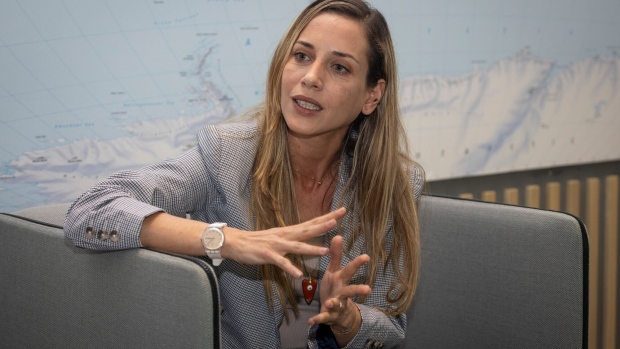Jul 2, 2024
Murdered Candidate’s Running Mate Takes on Noboa in Ecuador Vote
, Bloomberg News

(Bloomberg) -- Slain presidential contender Fernando Villavicencio’s running mate is now asking voters to entrust her with pulling Ecuador out of a violent crisis that’s captured global attention ever since his murder last year.
Andrea González, a 37-year-old environmental engineer who announced her candidacy for the February election last month, is hopeful she can inspire younger Ecuadorians to help solve their country’s myriad problems.
“It’s urgent,” she said in an interview in Quito, switching between Spanish and near-flawless American English. “We’re a generation that values liberty, the freedom to step into the street without being shot — let’s start with that.”
In one of Latin America’s deadliest nations mired in economic stagnation, González wants to tap the private sector and cutting-edge technology to fight crime and enact positive change. And though she still travels by squad car and gets protection from plain-clothes police bodyguards, she’s upbeat about the nation’s ability to extricate itself from its crises.
Her biggest challenge is name recognition. Just over 30% of respondents in a recent CEDATOS poll said they knew of González, though she came in at the middle of the pack in the pollster’s ranking of political potential. Still, Ecuadorian politics are volatile. Daniel Noboa polled in the single digits before his debate performance just days after Villavicencio’s assassination. Two months later, he won the election.
González said education and political reforms will be priorities, along with deep cuts to spending on bureaucrats and fuel subsidies. Major reforms will probably require yet another referendum, she added. “I know we’re sick of it, but we need to change the rules of the game or else we’re never going to leave this loop.”
The South American nation has suffered a traumatic decade. Oil prices that fueled a government spending boom plunged, narcotics-related violence surged, and violent bouts of public unrest erupted both before and after the Covid crisis that left bodies in the streets of González’s hometown, Guayaquil.
That violence included shocking political assassinations like that of Villavicencio, an anti-graft crusader she’d known since 2019. He was gunned down after leaving a campaign rally in the capital last August, two weeks before the first-round vote.
Ecuadorians are voting again on Feb. 9 because Noboa’s victory in last year’s snap election only granted him the right to finish former President Guillermo Lasso term. The winner will take office for a full four-year stint as president.
The field of candidates is still murky and will remain so until contenders formally register in late September or early October, according to Ruth Hidalgo, a political scientist at Universidad de las Américas in Quito. Initial campaigns by lesser-known politicians like González and Henry Cucalón, a former lawmaker and minister under Lasso, may just be trial balloons “to force a negotiation that could decant into a joint candidacy” of centrists against the current president, Hidalgo said.
A fresh wave of violence in January led Noboa — the scion of a banana empire, who is now 37 and seeking reelection — to brand drug cartels as terrorist organizations and declare a domestic war. With soldiers raiding jails and dangerous neighborhoods, murders have fallen and the government started construction of a new, $50 million maximum-security jail for 800 inmates in June.
“Noboa is still the favorite and benefits from the disarray in the opposition, but seven months is a long time in Ecuador politics,” said Nathalie Marshik, an emerging markets sovereign analyst at HSBC Securities. With the president’s approval ratings dipping to between 50% and 60% in recent polls, from a high of 80% when he moved against the gangs, “another strong candidate could still emerge.”
Former President Rafael Correa’s party, for example, will contest the election. Living in exile in Belgium to avoid serving time for graft, he retains a strong left-wing following and a large congressional presence. While his bloc has yet to name a candidate, Correa has mentioned Luisa González (no relation to Andrea), who lost to Noboa in last year’s runoff, as a potential contender.
No matter the final list of candidates, polls indicate that crime and unemployment remain Ecuadorians’ top worries.
El Salvador President Nayib Bukele’s heavy handed policies have “worked perfectly” for his smaller country but aren’t a solution for Ecuador, according to Andrea González. She said she would focus more on marine interdiction with radar, drones and the navy, as well as taking back control of jails that became headquarters for drug lords and universities of crime before Noboa sent in soldiers — a strategy she described as unsustainable in the long term.
“Honestly, he’s had it really tough,” she said of the current president, before arguing that Noboa has also failed to adequately fight corruption.
González, however, shares Noboa’s desire to get Ecuador’s fiscal situation in order after it once again sought financing from the International Monetary Fund this year.
“We totally need to reduce the number of ministries,” she said. “The downsizing of the state has to go ahead. It’s an obese, inefficient state that has become the No. 2 blackmailer of businessmen and entrepreneurs.”
To replace a bloated state with a lean government, González argues Ecuador must “say goodbye to the golden bureaucracy” and embrace artificial intelligence. “It’s evolution baby,” she said, “like the song” released by Pearl Jam in 1998.
Unlike left-wing climate groups and Indigenous organizations that have fought oil fields while protesting against a repeal of fuel subsidies, González favors replacing those stipends with support for agriculture and setting up a powerful state environmental protection agency.
Plus, she said young Ecuadorians need a healthy dose of “nationalism, for it to be cool to be Ecuadorian.”
--With assistance from Zijia Song.
©2024 Bloomberg L.P.








